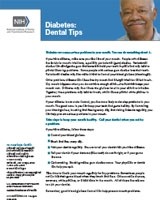Diabetes & Oral Health
On this page
Overview
People who have diabetes know the disease can harm the eyes, nerves, kidneys, heart and other important systems in the body. Did you know diabetes can also cause problems in your mouth?
People with diabetes have a higher chance of having periodontal (gum) disease, an infection of the gum and bone that hold the teeth in place. Periodontal disease can lead to pain, persistent bad breath, chewing difficulties, and even tooth loss. Diabetes can also slow down healing, so it can interfere with treatment of periodontal disease.
Other problems diabetes can cause are dry mouth and a fungal infection called thrush, which causes painful white patches in your mouth. Dry mouth happens when you do not have enough saliva—the fluid that keeps your mouth wet. Dry mouth can cause soreness, ulcers, infections, and tooth decay. Smoking makes these problems even worse. In addition, diabetes may also cause the level of sugar (glucose) in your saliva to increase. Together, these problems may lead to thrush.
Back to topCauses
If your diabetes is not under control, you are more likely to develop problems in your mouth. In turn, having gum disease may make your blood sugar harder to control.
Back to topSymptoms
If you have diabetes, be sure to take time to check your mouth regularly for any problems. Sometimes people notice that their gums appear swollen and bleed when they brush and floss. Others notice dryness, soreness, white patches, or a bad taste in the mouth. All of these are reasons to visit a dentist.
Back to topTreatment
Treatment depends on which problem you have. People with periodontal disease will need to receive treatment from a dentist, who may do a deep cleaning of your teeth or refer you to a periodontist for gum surgery. The dentist may also prescribe a special mouth rinse.
To treat symptoms of thrush, a dentist or doctor may prescribe a medicine to kill the fungus that causes it. If you have dentures (false teeth), you may also need a special solution to clean them.
For dry mouth, a doctor or dentist may prescribe a medicine to keep your mouth wet. Read more about dry mouth and symptom relief here.
Back to topHelpful Tips
Good blood glucose control is key to controlling and preventing mouth problems. People with poor blood glucose control get gum disease more often and more severely than people whose diabetes is well controlled. If you have diabetes, be sure to:
- Control your blood glucose.
- Brush twice a day and floss regularly.
- Visit your dentist for routine check-ups. Be sure to tell your dentist that you have diabetes.
- Tell your dentist if your dentures do not fit right, or if your gums are sore.
- Quit smoking. Smoking makes gum disease worse. Your physician or dentist can help you quit.
Additional Resources
- Prevent Diabetes Complications
Information from the Centers for Disease Control and Prevention (CDC) on how diabetes can affect many parts of the body, including your mouth. - Take Charge of Your Diabetes: Healthy Teeth
Information from the National Institutes of Health (NIH) and the CDC on preventing dental complications from diabetes. - MedlinePlus: Diabetes and Oral Health
The NIH National Library of Medicine's collection of links to government, professional and non-profit/voluntary organizations with information on diabetes and oral health. - Diabetes, Gum Disease, & Other Dental Problems
A publication from the National Institute of Diabetes and Digestive and Kidney Diseases (NIDDK) on how to maintain your mouth healthy if you have diabetes.
Diabetes & Oral Health Research from NIDCR
October 2024

